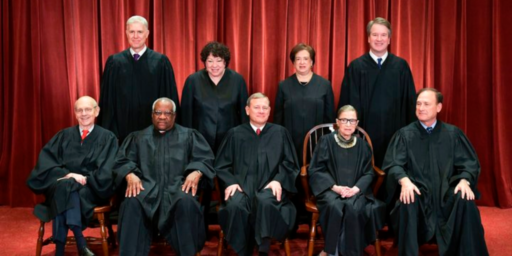ALBRIGHT ON THE U.N.
In contrast to her rather baffling Foreign Affairs piece which I discussed Thursday, Madelyn Albright’s piece in the current Foreign Policy about the United Nations is quite worthwhile, answering the major criticisms of the organization leveled by both the left and the right. She has a realistic notion of what that body can–and can’t–do.
She correctly notes that US-UN relations have always ebbed and flowed and indeed have been far worse at times than they are now; that the idea that the UN is a threat to US sovereignty is absurd; that we’re stuck with the current Security Council arrangement because fixing it is just too hard; and that the institution can get mired in political correctness and good old fashioned patronage.
Her view of how the Bush administration’s doctrine of preemption fits in with the UN system is also noteworthy:
The charter calls upon states to attempt to settle disputes peacefully and, failing that, to refer matters to the Security Council for appropriate action. Article 51 provides that nothing in the charter “shall impair the inherent right of individual or collective self-defense if an armed attack occurs against a Member of the United Nations, until the Security Council has taken measures necessary to maintain international peace and security.”
Compare that to this passage from President Bush’s 2002 National Security Strategy: “Given the goals of rogue states and terrorists, the United States can no longer solely rely on a reactive posture as we have in the past. The inability to deter a potential attacker, the immediacy of today’s threats, and the magnitude of potential harm that could be caused by our adversaries’ choice of weapons, do not permit that option. We cannot let our enemies strike first.”
The mystery here is not what the administration said, but rather why it chose to arouse global controversy by elevating what has always been a residual option into a highly publicized doctrine. In reality, no U.S. president would allow an international treaty to prevent actions genuinely necessary to deter or preempt imminent attack upon the United States. The notion that the United States has relied solely “on a reactive posture” in the past is not true. In the name of self-defense, U.S. administrations of both parties initiated actions during the Cold War that violated the sovereignty of other nations. In 1994, the Clinton administration considered military strikes against nuclear facilities in North Korea. In 1998, U.S. President Bill Clinton launched cruise missiles into Afghanistan and Sudan in retaliation for the terrorist bombing of two U.S. embassies in Africa and in an effort to prevent al Qaeda leader Osama bin Laden from striking again.
Whether tracking the language of Article 51 or not, the Bush administration’s preemption doctrine will prove a departure from past practice only if it is implemented in a manner that is aggressive, indifferent to precedent, and careless of the information used to justify military action. Calibrated and effective actions taken against real enemies posing an imminent danger should not overturn the international legal apple cart. Measures wide of that standard would indeed raise troubling questions about whether the United States is setting itself above the law or tacitly acknowledging the right of every nation to act militarily against threats that are merely potential and suspected. The administration approached that line by invading Iraq, but the issue was blurred by the multiple rationales given for the conflict–enforcement of Security Council resolutions (relatively strong legal grounds), self-defense (in this case, shaky), and liberation (shakier still). The issue now is whether the administration intends to strike first against nuclear aspirants North Korea and Iran (and, if so, on what evidence) and whether it will exhaust other options first. Thus far, the administration is traveling the diplomatic route.






Very well stated.
—